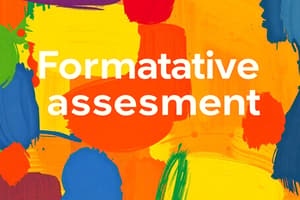Podcast
Questions and Answers
What is the primary purpose of summative assessments in early childhood education?
What is the primary purpose of summative assessments in early childhood education?
- To measure learning outcomes (correct)
- To observe child behavior
- To create lesson plans
- To guide learning
Summative assessments are commonly used in early childhood education.
Summative assessments are commonly used in early childhood education.
False (B)
Match the following reasons with why summative assessments are less prevalent in early childhood education:
Match the following reasons with why summative assessments are less prevalent in early childhood education:
Developmental variability = Children grow and learn at different rates Focus on holistic development = Early childhood education focuses on social, emotional, and physical growth Stress and pressure on children = Young children are sensitive to testing pressures Practical challenges = Many critical skills are hard to quantify Educational philosophy and policy = Emphasis on formative assessments and personalized learning
What is a unique challenge of using summative assessments in early childhood education?
What is a unique challenge of using summative assessments in early childhood education?
Formative assessments are used to measure learning outcomes at the end of a unit or semester.
Formative assessments are used to measure learning outcomes at the end of a unit or semester.
Why might summative assessments be less effective in early childhood education?
Why might summative assessments be less effective in early childhood education?
Study Notes
Summative Assessments in Early Childhood Education
- Summative assessments measure a child's learning outcomes after a designated instructional period.
- They differ from formative assessments, which are ongoing and meant to guide learning.
- Summative assessments typically occur after a significant period, such as the end of a unit, semester, or academic year.
- Examples of summative assessments include tests, projects, and other standardized methods, like midterms and final exams in high school.
- Summative assessments indicate what children have learned and assess their progress against established educational objectives.
Challenges of Summative Assessments in Early Childhood Education
- Developmental variability: Children grow and learn at their own rates, making it difficult to measure their learning or development accurately at any one moment.
- Limited scope: Summative assessments usually target specific academic skills and might miss the full range of early learning experiences.
- Stress and pressure: Young children are especially sensitive to the pressures of testing environments, which can lead to anxiety.
- Practical challenges: The reliability of summative assessments can be questionable with young children, as their performance can be heavily influenced by external factors.
- Educational philosophy and policy: Early childhood education emphasizes formative assessments, which support personalized learning and ongoing development.
Formative Assessments in Early Childhood Education
- Formative assessments are ongoing and meant to guide learning.
- They offer immediate feedback that can be used to tailor teaching strategies and support each child's growth.
- Educational policies and standards for early childhood often recommend observational, continuous, and integrated assessment methods rather than discreet standardized tests.
Studying That Suits You
Use AI to generate personalized quizzes and flashcards to suit your learning preferences.
Description
This quiz compares and contrasts formative and summative assessments in early childhood education, highlighting their differences and purposes. Learn about the importance of evaluations in measuring learning outcomes and guiding learning.




